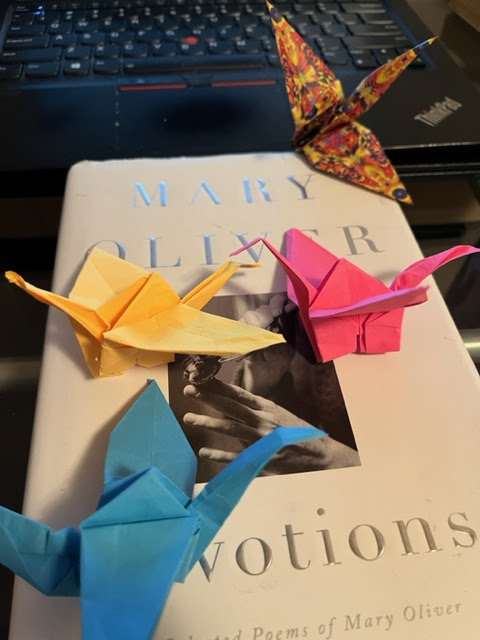Life Story
by: Mary Oliver
When I lived under the black oaks
I felt I was made of leaves.
When I lived by Little Sister Pond,
I dreamed I was the feather of the blue heron
left on the shore;
I was the pond lily, my root delicate as an artery,
my face like a star,
my happiness brimming.
Later I was the footsteps that follow the sea.
I knew the tides, I knew the ingredients of the wrack.
I knew the cider, the red-throated loon
with his uplifted beak and his smart eye.
I felt I was the tip of the wave,
the pearl of water on the eider's glossy back.
No, there's no escaping, nor would I want to escape
this outgo, this foot loosening, this solution
to gravity and a single shape.
Now I am here, later I will be there.
I will be that small cloud, staring down at the water,
the one that stalls, that lifts its white legs, that
looks like a lamb.
I think we are all products of the places where we live or have lived, just like Oliver. A person who grows up in a small town in the Upper Peninsula of Michigan is very different from a person who grows up in Orlando, Florida. This is the crux of the Nature versus Nurture debate. Are we products of how, where, and who we grow up with; or are our personalities simply implanted on our genetic makeup?
I know that who I am has been greatly influenced by my upbringing in the Upper Peninsula. While I love visiting more urban settings and experiencing their explosions of busy energies, I am a small-town boy at heart. Given the choice between a crowded dance party throbbing with alcohol and a quiet walk in the woods on an autumn evening, I will always choose the nature hike.
And I have also been influenced by the people in life, as well. My parents and siblings, friends and coworkers. I have been very lucky. In all of my years, I've had an abundant supply of love and support from close family and friends. These individuals have taught me a lot about myself and the world.
This evening, one of my closest friends of over 30 years, Lydia, led an origami workshop at the library where I work. She taught us to make paper cranes. Now, I have always been craft-challenged. I can't knit or crochet. I don't make birdhouses or paint oil landscapes. I'm a decent sketcher, and, of course, I can write. However, folding pieces of paper into animals is not in my wheelhouse.
Before the workshop, Lydia and I sat in my office and visited. We don't see each other as much as we used to. I worked side-by-side with Lydia at an outpatient surgery center for 20-plus years. On a daily basis, we shared our struggles and joys, celebrations and lamentations together. Lydia was one of my sister Sally's best friends, as well. Sally trusted Lydia, and, when Sally got really sick, Lydia helped my family arrange her end-of-life care, to make sure that my sister died with dignity, surrounded by people who loved her. Lydia was present when Sally took her last breath. So, when I say that Lydia and I are close friends, that barely scratches the surface of what our friendship is.
My personality was shaped by the time I worked at that surgery center, and by my relationship with Lydia. Therefore, when Lydia told me I was going to learn how to fold paper cranes, I went along for the ride. Because I trust her.
I mangled more sheets of paper than I transformed. Yet, at the end of about an hour-and-a-half of folding and swearing, I was on my way to making a small flock of colorful cranes.
In today's poem, Oliver says she is leaves from black oaks. A blue heron feather. A pond lily and footsteps on a beach. The tip of waves.
Tonight, Saint Marty was a piece of paper, folded into something beautiful by his friend, Lydia.

No comments:
Post a Comment